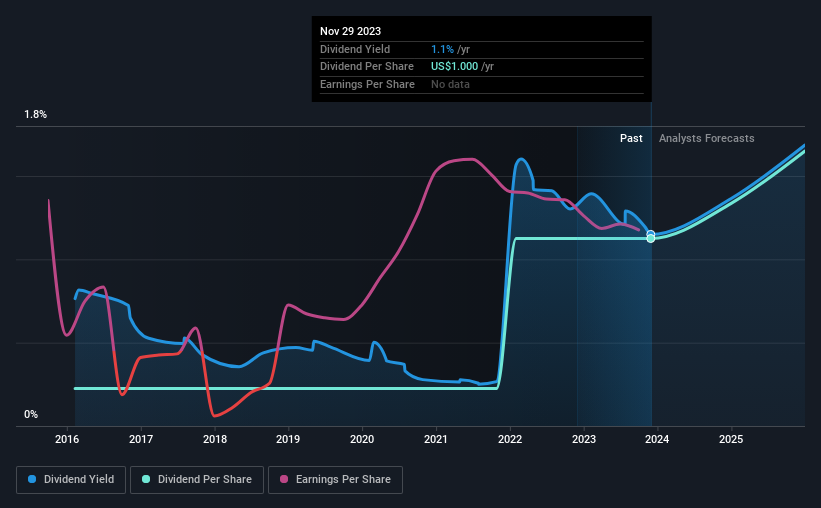Be Sure To Check Out PJT Partners Inc. (NYSE:PJT) Before It Goes Ex-Dividend
Regular readers will know that we love our dividends at Simply Wall St, which is why it's exciting to see PJT Partners Inc. (NYSE:PJT) is about to trade ex-dividend in the next four days. The ex-dividend date occurs one day before the record date which is the day on which shareholders need to be on the company's books in order to receive a dividend. The ex-dividend date is an important date to be aware of as any purchase of the stock made on or after this date might mean a late settlement that doesn't show on the record date. This means that investors who purchase PJT Partners' shares on or after the 5th of December will not receive the dividend, which will be paid on the 20th of December.
The company's next dividend payment will be US$0.25 per share. Last year, in total, the company distributed US$1.00 to shareholders. Based on the last year's worth of payments, PJT Partners has a trailing yield of 1.1% on the current stock price of $86.98. Dividends are a major contributor to investment returns for long term holders, but only if the dividend continues to be paid. So we need to check whether the dividend payments are covered, and if earnings are growing.
View our latest analysis for PJT Partners
Dividends are usually paid out of company profits, so if a company pays out more than it earned then its dividend is usually at greater risk of being cut. That's why it's good to see PJT Partners paying out a modest 31% of its earnings.
When a company paid out less in dividends than it earned in profit, this generally suggests its dividend is affordable. The lower the % of its profit that it pays out, the greater the margin of safety for the dividend if the business enters a downturn.
Click here to see the company's payout ratio, plus analyst estimates of its future dividends.
Have Earnings And Dividends Been Growing?
Companies with consistently growing earnings per share generally make the best dividend stocks, as they usually find it easier to grow dividends per share. Investors love dividends, so if earnings fall and the dividend is reduced, expect a stock to be sold off heavily at the same time. It's encouraging to see PJT Partners has grown its earnings rapidly, up 25% a year for the past five years.
The main way most investors will assess a company's dividend prospects is by checking the historical rate of dividend growth. In the past eight years, PJT Partners has increased its dividend at approximately 22% a year on average. It's exciting to see that both earnings and dividends per share have grown rapidly over the past few years.
To Sum It Up
Is PJT Partners worth buying for its dividend? Companies like PJT Partners that are growing rapidly and paying out a low fraction of earnings, are usually reinvesting heavily in their business. Perhaps even more importantly - this can sometimes signal management is focused on the long term future of the business. In summary, PJT Partners appears to have some promise as a dividend stock, and we'd suggest taking a closer look at it.
With that in mind, a critical part of thorough stock research is being aware of any risks that stock currently faces. To help with this, we've discovered 1 warning sign for PJT Partners that you should be aware of before investing in their shares.
If you're in the market for strong dividend payers, we recommend checking our selection of top dividend stocks.
Have feedback on this article? Concerned about the content? Get in touch with us directly. Alternatively, email editorial-team (at) simplywallst.com.
This article by Simply Wall St is general in nature. We provide commentary based on historical data and analyst forecasts only using an unbiased methodology and our articles are not intended to be financial advice. It does not constitute a recommendation to buy or sell any stock, and does not take account of your objectives, or your financial situation. We aim to bring you long-term focused analysis driven by fundamental data. Note that our analysis may not factor in the latest price-sensitive company announcements or qualitative material. Simply Wall St has no position in any stocks mentioned.

